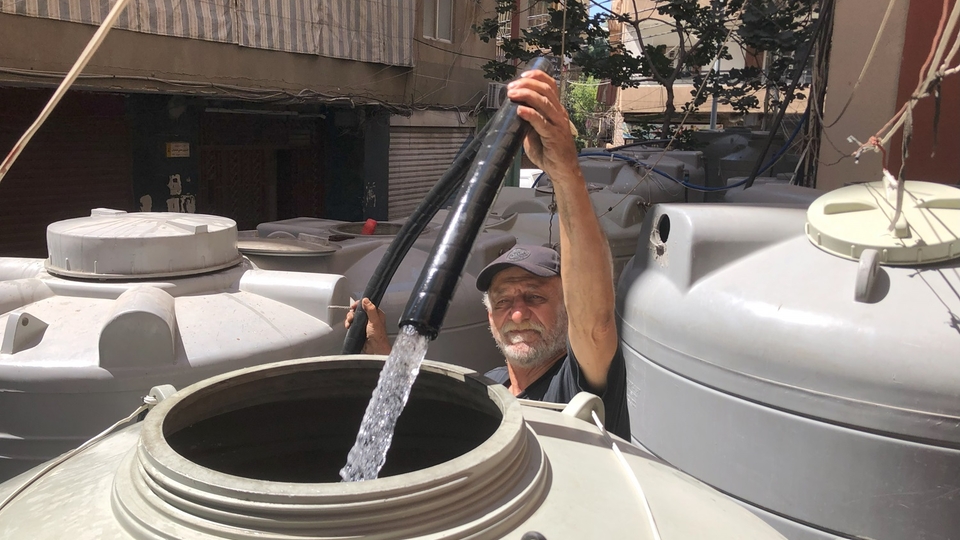Riding with the Black Hose Brigade: The Truckers Who Bring You Water When the Government Fails
This is Part 2 of a four-part series on water in Lebanon, covering its unsavory substitutes, its uses and misuses, the origin story of its crisis, and finally, its weaponization.
Down a residential street in Burj al-Barajneh, lined with buildings that look decades old, Abou Khaled gets ready to make water gush forth from dry taps — at a price, of course. He stops his little yellow truck in front of an old pink building, marking the start of his day shift. “One of my three wives lives in this building,” he says cheerfully. The other two live in different buildings on the same street.
Jumping out of his truck, he grabs a large black water hose from the back and drags it through the parking lot to the back of the building, where around 10 large gray plastic tanks await him. He places the mouth of the hose inside one of them, returns to his truck, and switches on the generator that pumps the water from his tank to his client’s. Soon after, water begins to flow. As he maneuvers the bulky hose through two of his client’s tanks, filling each to the brim, they occasionally leak a small amount of water — a little sacrifice to the water gods that he is forced to make, like everyone else, in the absence of a functioning state.
Lebanon’s taps should have water. The country is water-rich. Its donors have poured billions into the water sector in recent years. And most households in Lebanon are connected to the government infrastructure that, in theory, delivers water to their taps. “This shows us that, somewhere, somehow, there was a thought of bringing water to this tap,” says Roland Riachi, researcher in political economy and ecology. “But it failed.”
When the government water dries up, as it does for much of Lebanon every summer, water truckers like Abou Khaled become Lebanon’s unofficial Water Establishments: they succeed where Lebanon’s government and its many donors, for all their billions, have failed.
Since the 1970s, Lebanon’s water governance has been slowly gutted — first by the civil war, and then by the neoliberal reconstruction that followed.
Abou Khaled prides himself on his job; in the absence of state-supplied water, he sees selling water as his duty to the people. He is not wrong: Since the 1970s, Lebanon’s water governance has been slowly gutted — first by the civil war, and then by the neoliberal reconstruction that followed. As the Lebanese government’s water sector fell further and further into disrepair, a patchwork of unregulated water vendors and private wells has risen to supplement it. These informal networks, which vary from region to region, are often people’s only way to get household water for showering, washing dishes, cleaning, and flushing toilets.
But while they provide a vital service, the water trucks are almost entirely unregulated. They do not always follow legal requirements for water testing and quality control, let alone for the licensing and registration of pickup trucks to carry specific kinds of goods. Instead, they operate according to their own rules, often understood and unspoken, but sometimes enforced with violence, dividing areas of coverage among each other, establishing price structures, and defining their clientele as they please.
With no government oversight, these water trucks effectively control much of Lebanon’s water supply to households, adjusting prices at their whim, and delivering water without sanitary inspections. The result is that many people in Lebanon have to pay top dollar for water of uncertain quality — and that is highly likely to be contaminated, as a UNICEF report found in 2016.
Despite not holding any kind of license for this territory — now, or at any point in time, he says matter-of-factly — Abou Khaled has never faced any trouble with the police or regulatory bodies.
The risks of leaving water provision to unmonitored private suppliers became clear in 2022. That fall, cholera spread rapidly through North Lebanon, where two thirds of residents get their tap water from what the Ministry of Energy and Water (MoEW) calls “unknown” sources — meaning not a registered connection with the public utility. Beirut and Mount Lebanon, where 92 percent of the population is connected to the public water utility, had far fewer cases, despite a much larger population.
The cholera outbreak, Lebanon’s first in three decades, sickened thousands and killed at least 23 people. But despite the hazards of contaminated water, Lebanon’s public water sector does not seem likely to replace this flourishing private market any time soon. By failing to provide tap water to much of Lebanon’s population, the state and its donors have effectively handed running water to a system of unregulated private operators: de facto privatization, by informal black market, of an essential public good that also happens to be a basic human right.
“You see water trucks everywhere all the time,” says Riachi. “Hopefully one day they will stop, and clean water will be delivered through the tap. But until now, what we are shown, and what we can see, is that we are moving toward worse circumstances.”
“Anyone Who’s Able To Dig a Borehole Does”
Our day begins at a well in Cocodi, just outside Burj al-Barajneh. It is around 1:30 p.m., the midday peak of a June heatwave: 35 degrees Celsius. We are here to meet Hassan Awala, a former water vendor who quit the water trucking business 10 years ago. We want to find out more about the informal sector that fills the gap left by the state, and brings water to people’s homes, and Awala has offered to introduce us to some of his former colleagues.
We meet at the well’s office, a one-room concrete building that looks out onto the street. As we peer inside the dim, sparsely furnished little room, Awala introduces us to a tall, suntanned lumberjack of a man with piercing blue eyes, wearing a black cap and olive green cargo pants: Nessim Mehieddine, known in his neighborhood as “Abou Khaled,” who has been vending water here for the last 35 years.
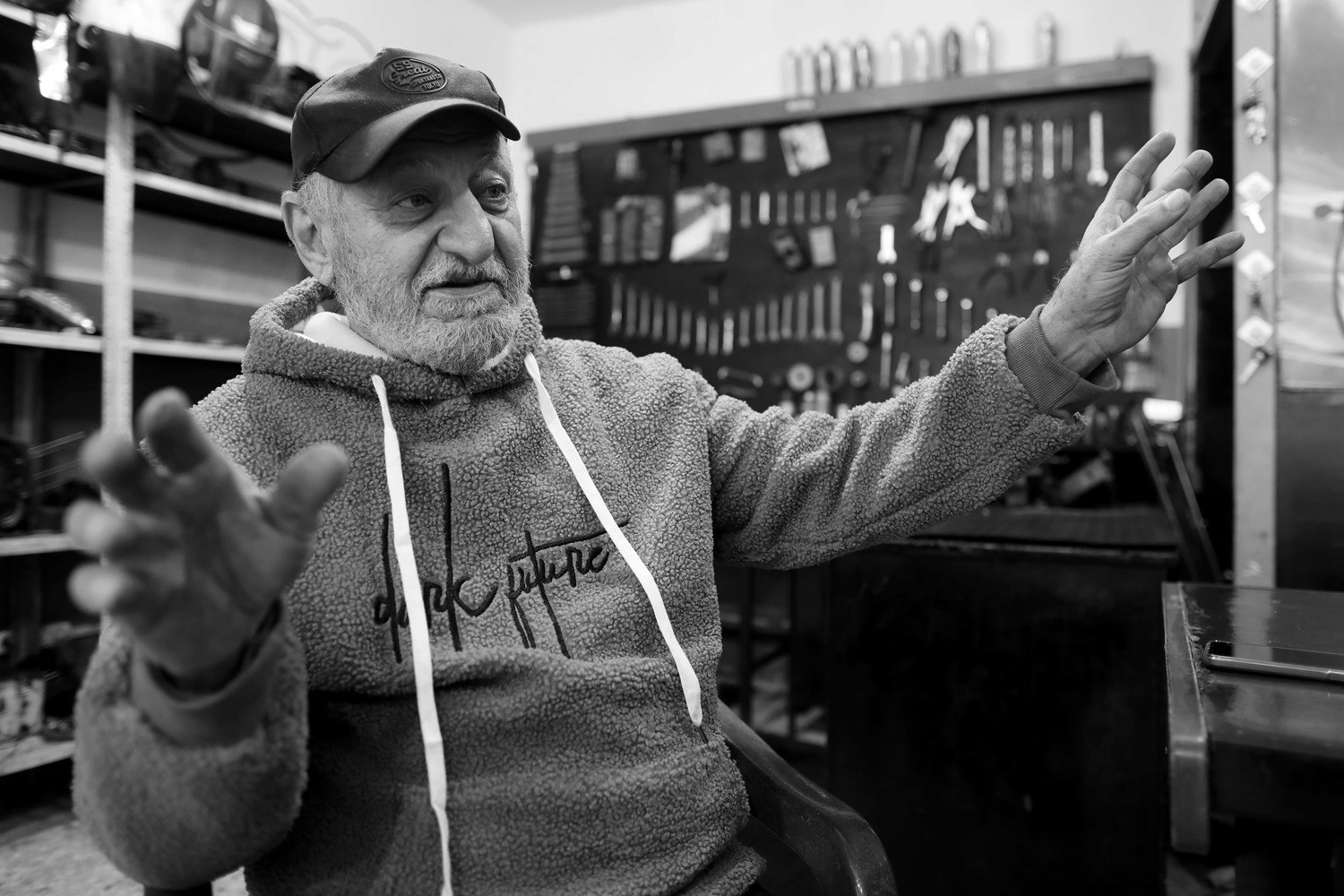
Nessim “Abou Khaled” Mehieddine first came to Lebanon in 1989, and was shocked to find there was no steady supply of water in Burj al-Barajneh. February 16, 2024. (Marwan Tahtah/The Public Source)
Abou Khaled extends a rough, soot-covered palm in greeting, smiling through a thick, nicotine-stained, white mustache. Hussein Yaacoub, the owner of the well, greets us from his chair by the door. He has a leg injury — his crutches are leaning on the wall nearby — so he doesn’t get up. “Please take a seat,” he says, motioning to one side of the room, where a sofa bed is jammed behind a large desk; on the other side, there’s just enough room for a single white plastic chair.
The well is just across the road from the easternmost tip of Lebanon’s only (functional) airport, which adds to the room’s noise, already humming to the sound of machinery and vehicles: the roar of planes taking off and landing, the unrelenting grind of the well’s generator, and roughly four trucks at a time idling just outside to fill their tanks with water.
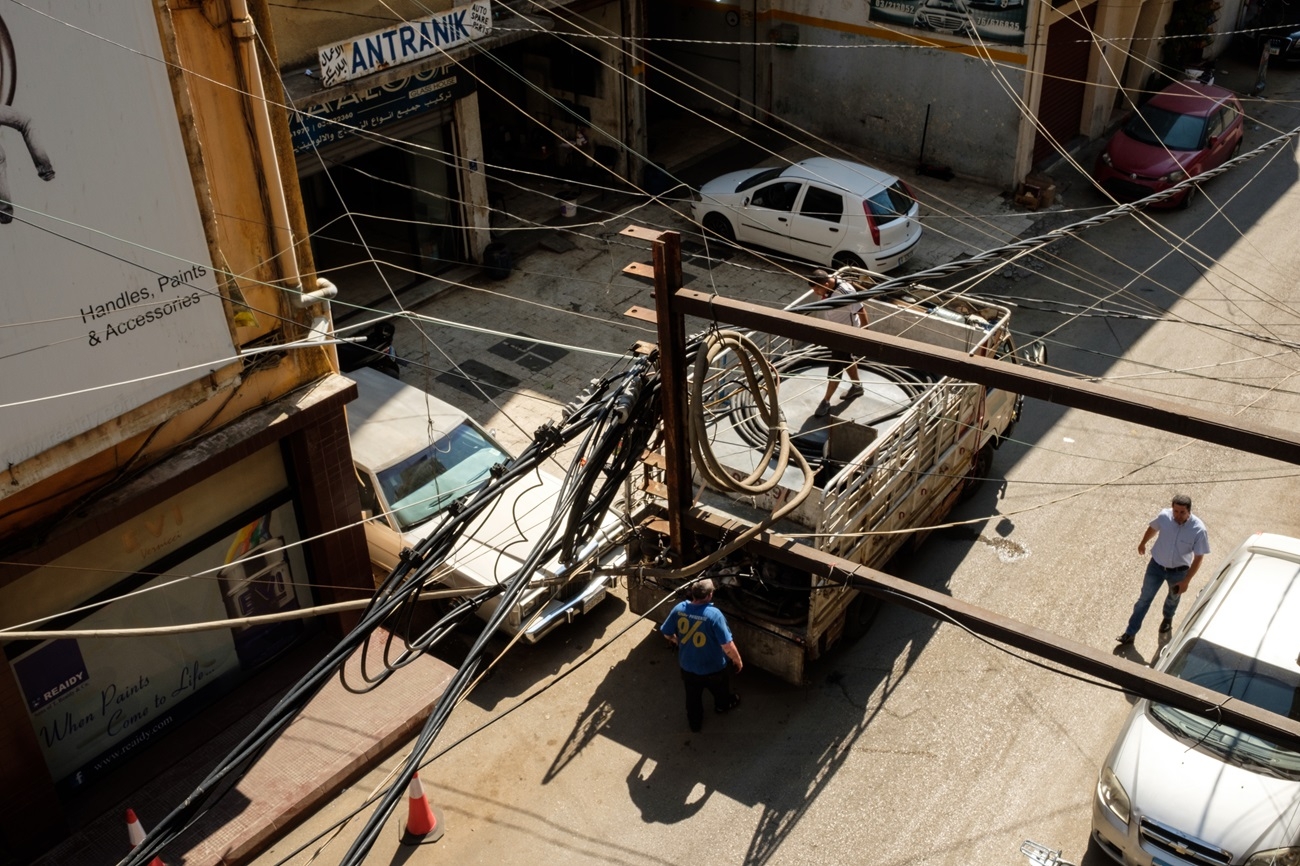
In Beirut, even quiet is reserved for a privileged few.
So what is the relentless noise pollution like for the rest of Beirut's residents?
This dark, sweltering little room is the nerve center of both a business and a not-so-public utility: it is one of countless wells across the country where men like Yaacoub and Abou Khaled freely extract a public good without limitations, carve up neighborhoods among themselves, and dole it out to anyone who can pay.
By failing to provide tap water to much of Lebanon’s population, the state and its donors have effectively handed running water to a system of unregulated private operators.
Lebanon has between 80,000 and 100,000 wells in total; fewer than 30,000 are licensed. Most of them extract water for agricultural use. Nobody we spoke to seems to know exactly how many are in the business of supplying household water. But Awala says the number has increased in recent years. “Before, they used to be limited,” he says. “But nowadays anyone who’s able to dig a borehole does.”
In the past, when Dahiyeh was agricultural land, most wells would pump water for crops. Some of those wells are 60 or 70 years old, maybe more, guesses Awala. (He calls them نواعير, norias, also the name for the region’s indigenous water wheels, which date back to the 4th century BC.)
With urban sprawl, space became more limited. Today there isn’t anywhere to farm in Dahiyeh. But wells that sell to water trucks are a booming business. “They’re everywhere nowadays, you’ll see them wherever you go,” says Awala. “If someone has land and they have freshwater, they’ll turn it into a business.”
An “Unspoken Agreement”
Yaacoub’s well has been up and running for the last 15 years. Abou Khaled has been buying water from him since then. Before that, he would fill up water at a well in al-Siyyad; he stopped when the well owners dug too deep and caused saltwater incursion.
Abou Khaled first came to Lebanon in 1989, as the civil war was grinding down, from Abidjan, in Côte d’Ivoire, where he was born and lived the first 40 years of his life. When he got to Beirut, he was staying with relatives, and so at first he didn’t understand why his uncle’s wife kept asking him to fill up giant jugs of water every time he left the house.
He soon realized there was no state electricity and no water — “When I first arrived to al-Burj, there was no water!” he says, laughing in disbelief — and quickly took matters into his own hands.
[Water truckers] freely extract a public good without limitations, carve up neighborhoods among themselves, and dole it out to anyone who can pay.
At the request of his uncle’s wife, he started to transport five or so 19-liter “gallons” of water in his car whenever he came and went to visit his father in the hospital in Achrafieh. Then he took water delivery a step further, and turned it into a business. “I decided to get a pickup truck,” he says, “and have been doing this work since 1989.”
Back then, Abou Khaled was providing water for his family and neighbors. But since then, Lebanon’s water situation has remained the same — or gotten worse — and as a result, his business has only grown. Over the years, he expanded his existing connections into bordering streets, and built a network of clientele that he still caters to today. Every other vendor he knows built their pool of clients the same way.
“I bring water to Burj al-Barajneh: the surroundings of where I live and the people I know,” he says with pride. “We work to provide for people. There are around 20 trucks working here, and everyone has their own neighborhood and clients.”
Water vendors have an “unspoken agreement” to supply water to their own areas, Abou Khaled says. “We all have our respective areas and don’t trespass,” he tells The Public Source. “I don’t cross into someone else’s territory, and they don’t cross into mine.”
These agreements leave consumers vulnerable during peak demand in the summer months, exclusively dependent on one vendor who might not be able to deliver water to all those in need for days at a time.
Water vendors divide and conquer neighborhoods – down to their narrowest alleyways – much like how local political parties create and maintain clear demarcation lines to exert control and influence over the residents within them. This power-sharing agreement that characterizes the trucking sector, and most other informal sectors providing essential services, enables water vendors to set or change prices arbitrarily.
These agreements leave consumers vulnerable during peak demand in the summer months, exclusively dependent on one vendor who might not be able to deliver water to all those in need for days at a time. And in the absence of competition, vendors are not only more likely to engage in price gouging, but to use water as a tool to exchange favors – deprioritizing access to already disadvantaged families.
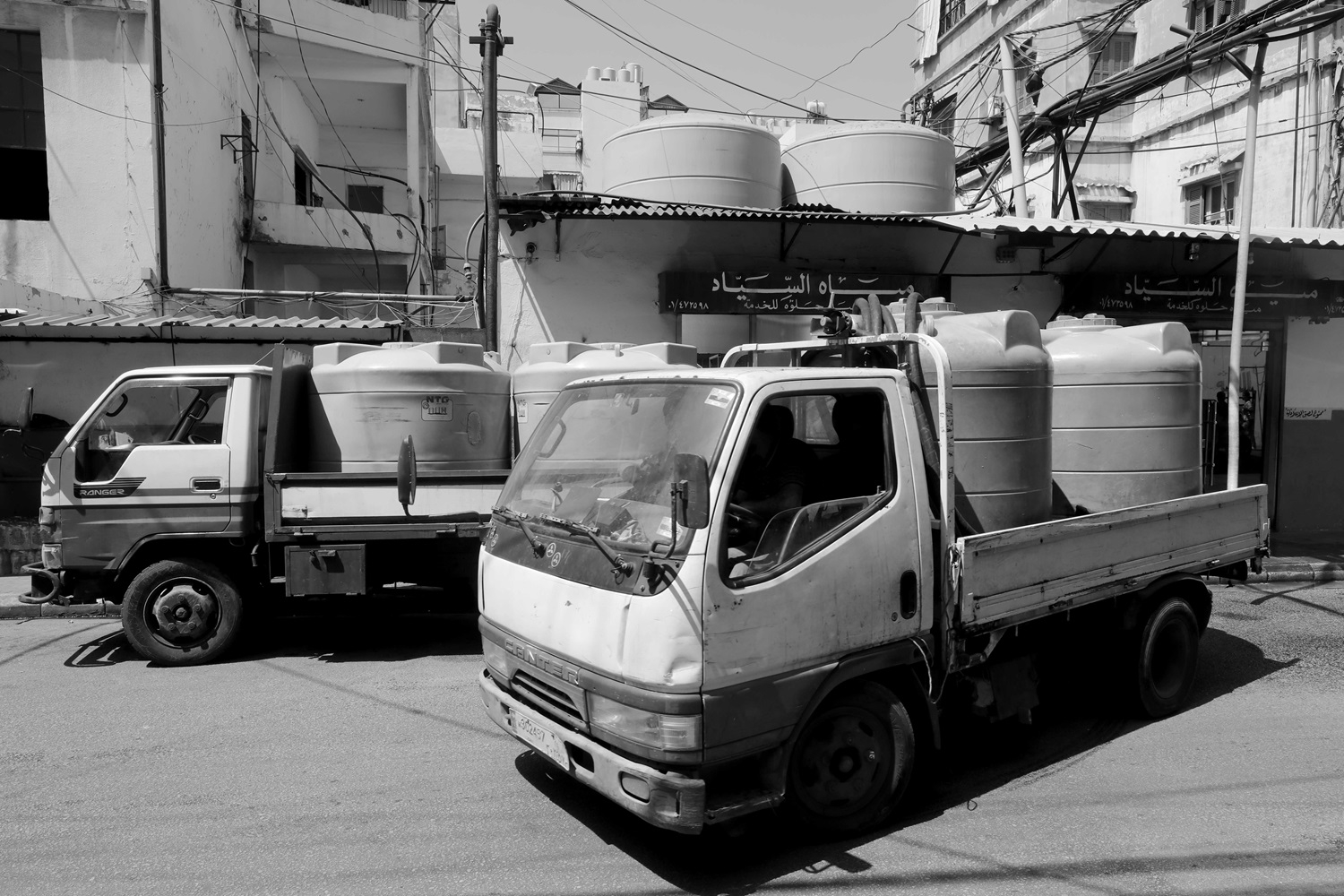
Abou Khaled and his colleagues used to fill up water in al-Siyyad, until the well owners dug too deep and caused saltwater incursion. Al-Siyyad, Lebanon. August 31, 2021. (Marwan Tahtah/The Public Source)
Poaching another vendor’s clients is serious business and can lead to conflict. The same street might have multiple vendors, but each vendor has their clients. If a vendor tries to poach another vendor’s clients, the vendors call their group of friends, and a fight may break out. “They’ve informally agreed not to steal each other’s clients,” Awala says, “but fights still happen.”
In exceptional cases, Awala says, one vendor may call a colleague to cover for him during peak business hours. When Awala quit the water vending business, he transferred his clients to a new vendor he approved of.
But in general, this small-scale cartel arrangement, based on loyalty and trust, does not make for competitive pricing. “Even if there are cheaper options in the same area,” Awala says, “the client wouldn’t even think about switching to a cheaper vendor.” In reality, the client wouldn’t be allowed to switch vendors even if they wanted to.
More Precious Than Gold
Yaacoub, the well owner, currently charges $1.5 per 2,000-liter tank. Abou Khaled usually fills up the two large 3,000-liter plastic tanks that sit on the back of his yellow pickup truck, parked just outside the Cocodi well. Once the truck’s tanks are full, Abou Khaled bids Yaacoub farewell, and invites Awala and us to come along to make a delivery.
Abou Khaled’s first delivery is 2,000 liters, for which he says he charges 350,000 to 400,000 L.L. (around $4 at the time, in June 2023, and still is). He says he keeps his prices low as a means of easing people’s current financial hardships, which is why he is comfortable with earning less than others.
Breaking down the price, Abou Khaled says it includes paying the well’s owner when pumping water from the source, fuel costs, truck maintenance, and each vendor’s profit. “The pick-up truck runs all day long, so problems are bound to happen and repairs are costly,” he says.
“Around 70 percent of our family’s income goes to bills. Water bills take up a very large chunk.” —Intisar Hamm, produce packager in a factory.
The price of vended water varies depending on the vendor and location. In Hamra, one water vendor charges L.L. 900,000 ($10) for 2,000 liters, whereas a water vendor in nearby Ain al-Mreisseh charges L.L. 2,000,000 ($22) for the same amount. Vendors may charge more based on where the client is located (or how much fuel they need to get there), and whether or not their tank is on the ground floor or the building’s roof (as that means the vendor has to use his generator to pump water upwards).
Today, households can pay anywhere from $10 to $20 per standard 2,000-liter tank — a lot for many families. Depending on the size and consumption of the family, and where they live, some families need to refill as often as twice a week — meaning that they have to pay private vendors at least $40 a month to make sure they always have water for basic household tasks.
Intisar Hamm moved to Kafa’at, a neighborhood in Dahiyeh, in 2018. In those days, state-provided water was supplied once or twice a week. But then its frequency started to dwindle, until the supply eventually stopped completely.
But water is a top priority for Intissar — one she says she can’t cut down on. “I’m really careful about cleanliness, and I have three sons,” she says. “We use more water than most people.”
Before the crisis, she used 2,000 liters every two days. Today, her household pays around L.L. 2,500,000 (or $28) on water each month. “Around 70 percent of our family’s income goes to bills,” says Hamm, who works as a produce packager in a factory. “Water bills take up a very large chunk.”
Water Flowing Underground
On paper, Lebanon is water-rich. Along with its 51 aquifers, tiny Lebanon has a remarkable amount of renewable water — ground and surface water that is replenished every year by rainfall and snowmelt — for its size: 4.5 billion cubic meters of renewable freshwater annually. In a perfect world, that would be more than enough to meet Lebanon’s annual withdrawal rate of 1.8 billion cubic meters.
In that ideal world, water’s journey from the ground to the tap would be a straightforward process. Not only does Lebanon have more than enough natural water, it also has most of the necessary water infrastructure in place to bring clean freshwater to every tap.
But what Lebanon doesn’t have is a reliable supply of electricity. And that is where the cascade of problems begins: water’s journey from its source to your house relies on electricity at almost every step of the way. Lebanon’s particular brand of de facto privatization is contagious: when the government consigns one vital public function to the whims of the private sector, it brings the rest of them with it, leading to a series of breakdowns that all compound each other.
Before it reaches our buildings and taps, water moves through an unseen network of pipes, inside large concrete chambers underneath the streets — it is “constantly passing under our feet, under pavements, and under roads until they get to near your building.” —Jawad Taher, water and development advisor and consultant
Lebanon’s water code (Law No. 192/2020) protects surface water. But despite that, most of it is heavily polluted, primarily by untreated sewage — just one of many problems that originate, in large part, with the country’s unreliable electricity supply. The result is that almost half of Lebanon’s water supply is groundwater, which is mainly sourced through springs or wells.
Springs are naturally-flowing bodies of water. They gush out of the ground at a given spot. Anyone looking to access that water can clean up the area around it — the “water catchment” or “springhead” — to create a pond or reservoir. That makes it easier to connect intake pipes that move the water wherever you want it to go.
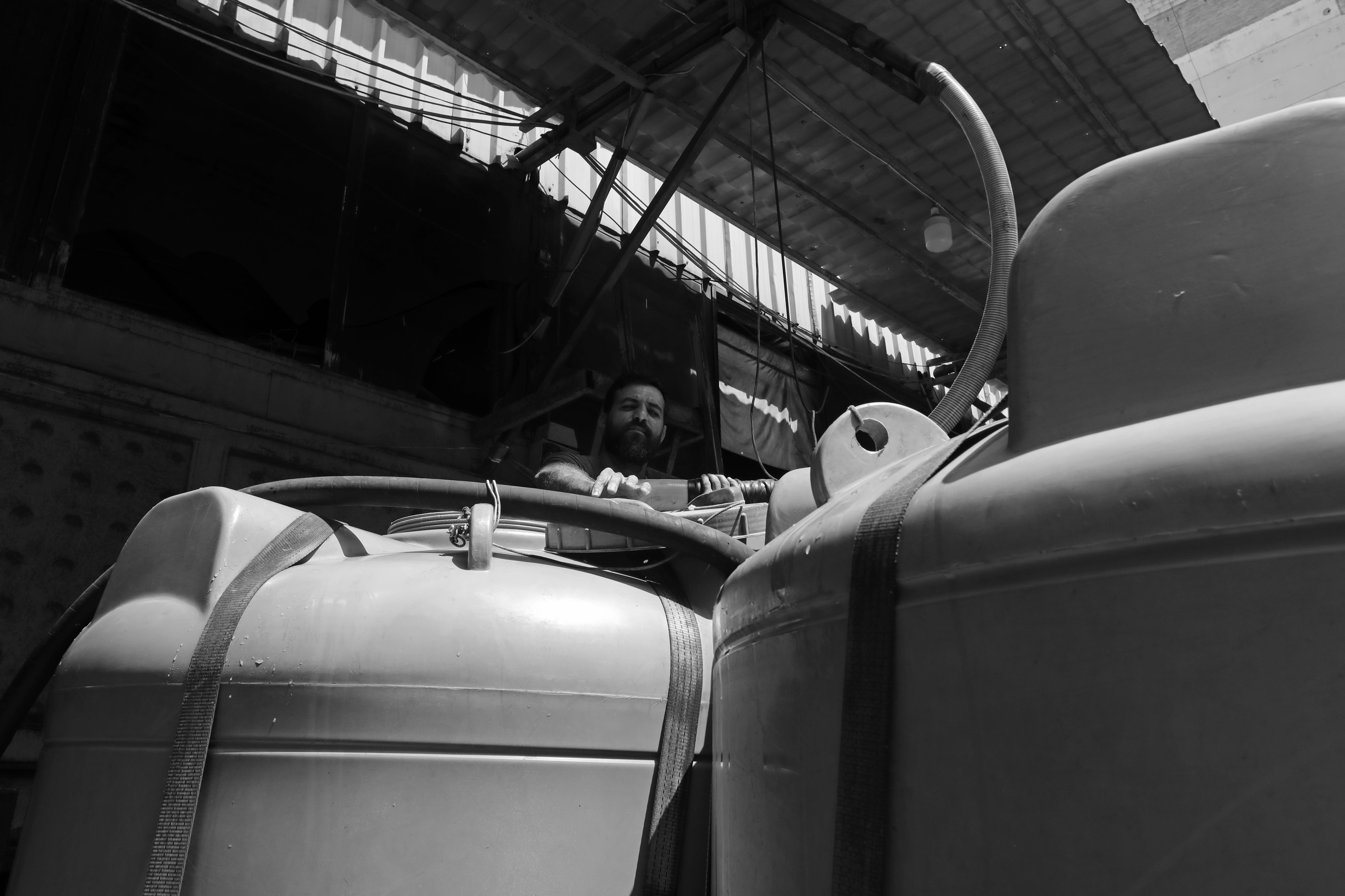
A water vendor stops at a well in al-Siyyad to fill the tanks on the back of his pickup truck. Al-Siyyad, Lebanon. August 31, 2021. (Marwan Tahtah/The Public Source)
Wells, on the other hand, are man-made: holes bored into the ground that can run hundreds of meters deep, until they reach groundwater. A well is “an artificial spring of sorts,” says Jawad Taher, water and development advisor and consultant, that takes groundwater and draws it up to the surface.
Pumping water from underground requires some form of mechanical force. These days, most commonly that’s a pump at the bottom that forces water upwards, powered by electricity. When the water makes it to the surface, whether by spring or well, you need to move it across hills and valleys and into people’s homes. To do this, you need pipes, and some form of force. If you’re lucky, that force is gravity.
But if you’re not lucky enough to live downhill from your water source, then you need pressurized pipes, which can move water slightly upwards. In Beirut and Mount Lebanon, about 40 percent of households get their water from pipes that use gravity. The remaining 60 percent need pumping stations to push the water along. Those cannot run without — you guessed it — electricity.
Not only does Lebanon have more than enough natural water, it also has most of the necessary water infrastructure in place to bring clean freshwater to every tap.
Before it reaches our buildings and taps, water moves through an unseen network of pipes, underneath the streets — it is “constantly passing under our feet,” says Taher, “under pavements, under roads, and inside large concrete chambers, or manholes, until they get to near your building.”
When the larger pressurized water pipes get to your building, they connect to a series of smaller and smaller pipes right outside it via a “switch,” called a bouche à clé in French, that allows water to flow into the smaller building pipes. Inside a building’s basement is a gauge that, when toggled, conveys water into homes — and out your taps and showerheads.
During Lebanon’s economic collapse, which began in 2019, the country’s four Regional Water Establishments (RWEs) could not rely on Électricité du Liban (EDL), the state’s public utility, which was virtually nonexistent by 2021. Instead, the public water establishments had to purchase diesel priced in dollars on the global market in order to pump water. This left them operating at a deficit, unable to afford parts, repairs, or diesel amid rampant inflation, and couldn’t meet the country’s water needs.
Lebanon’s water establishments are also responsible for treating the water along its journey through the piping system — either at the source well or spring, or somewhere downstream, says Taher, “but definitely before reaching users.”
“Contrary to common opinion, the majority of water pumped by the state to our houses starts off — and is sustained for a long time — as quite clean water that is safe to use. Unfortunately, some of our networks, and our building networks and water tanks at home, are unclean, so the water potentially gets contaminated there.” —Jawad Taher, water and development advisor and consultant
“Filtering” the water “scrubs” it of sediments or any visible physical contaminants. Treatment, on the other hand, eradicates biological and chemical contaminants. In a final step, Lebanon’s Water Establishments also add chlorine into the water stream. That way, if the piping networks themselves contain any bacterial contamination — from sewage, for example — the chlorine kills it.
This final step of adding chlorine directly to the water networks is key, Taher says, as Lebanon’s old piping networks are prone to fracture. If the pipes are open even slightly, the water can come into contact with dirty soil or sewage.
This last mile, says Taher, is where contamination usually happens. “Contrary to common opinion, the majority of water pumped by the state to our houses starts off — and is sustained for a long time — as quite clean water that is safe to use,” Taher says. “Unfortunately, some of our networks, and our building networks and water tanks at home, are unclean, so the water potentially gets contaminated there.”
Because the public is more or less aware that the piping network is not clean, and that state water is not reliable, people no longer trust state-supplied water. If they can afford to, they leave it for cleaning and personal use and buy bottled drinking water instead. In Beirut, a whopping 92 percent of households get their drinking water from non-piped sources like bottled mineral or purified water.
A State of Absence
But in places like Bourj al-Barajneh, all of this is moot, because for much of the year the water never makes it to people’s taps. In some areas, buildings are not connected to the water network at all, so they need water delivered all year round. In other areas, the government water supply is not enough for regular use, in large part because the water networks’ decades-old pipes leak around 40 to 50 percent of water.
State water shortages peak during the height of summer and early autumn, when there is a significant decrease in rainfall and higher demand on water reserves. This leads to a spike in water deliveries during the dry months — which means business for Abou Khaled. “From July to December, there’s usually high demand on water,” Abou Khaled said.
According to Abou Khaled, municipalities don’t usually intervene in their jobs — not even to carry out quality checks on water. Despite not holding any kind of license for this territory — now, or at any point in time, he says matter-of-factly — Abou Khaled has never faced any trouble with the police or regulatory bodies. Except for once, back in 1992, when a police officer tried to stop him and his peers from filling up water at the well in al-Siyyad.
“He said there was an order from Baabda that we couldn’t fill up water,” Abou Khaled recalls, chuckling at the irony.
“They weren’t bringing water to homes, and they weren’t letting anyone else. How does that work?” he asks. “If I called the women of the neighborhood and told them to come, do you have any idea what they would’ve done to him?”
He laughs, imagining the scene. “I told him: ‘You bring water to households, and you won’t see pickup trucks in the streets.’”
—Additional editing and fact-checking by Richard Salame.
In Part 3 of this series, The Public Source lays out the beginnings of today’s water crisis from its roots in Ottoman-ruled Lebanon to the economic collapse of the past five years.
